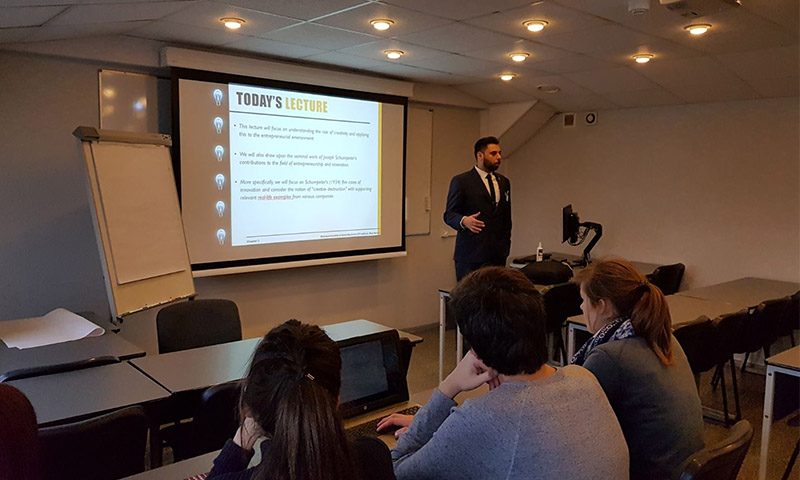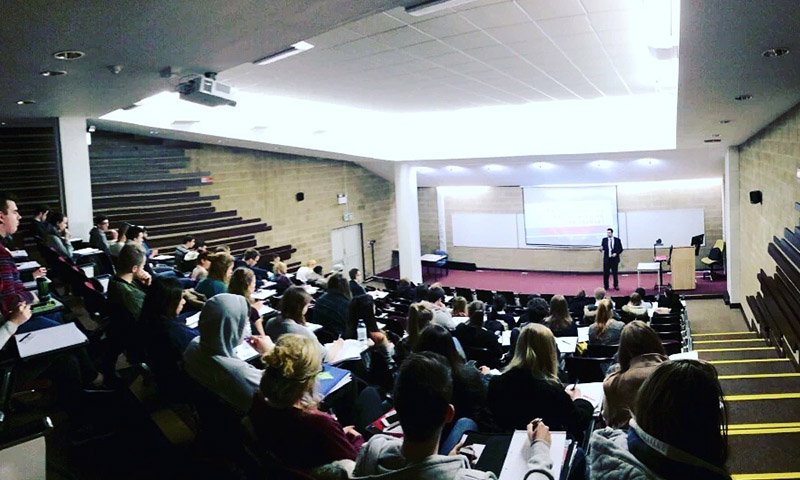Dr Naveed Yasin is an Associate Professor in Entrepreneurship & Innovation and Interdisciplinary Enterprise Education Coordinator at the Canadian University Dubai. A highly experienced Senior Academic in Entrepreneurship with over 10 years of experience and a demonstrated history of delivering excellence in the education management industry internationally (UK, Oman, and now the UAE).
The inclusion of enterprise and entrepreneurship education is increasingly being recognised as a driver of students’ economic and academic success across Higher Education Institutions in the United Arab Emirates. The primary goal of Universities remains to equip the next generation of professionals with contemporary skills, knowledge and abilities that are in-demand by employers and the economy at large. For enterprise educators, this poses several opportunities to evaluate the effectiveness of the teaching and learning pedagogies that are applied as a vehicle for knowledge transfer and to disseminate their methods and practices into a published scholarly research output.
In this article, I will discuss the general notion of ‘research-based teaching’, and then present a more detailed explanation about the value of ‘teaching-informed research’, followed by 8 potential ideas for ‘teaching based research’ opportunities in enterprise education. Lastly, the article will conclude with a summary of the article.
Research Informed Teaching
Although there has been a strong emphasis on ‘research-informed teaching’ in enterprise education globally, which generally denotes that empirical research should be used to teach students the research findings of their specialist field, nevertheless there is very little scholarly attention attributed to its counterpart, which is ‘teaching informed research’. Often many enterprise educators seek inspiration from empirical research for fresh learning content that is used to disseminate contemporary knowledge in the classroom. Still, often educators overlook and to some extent, unintentionally dismiss the valuable scholarly efforts that could inform the future of teaching and learning pedagogies in entrepreneurship.
Here are 8 ‘Teaching Informed Research’ Ideas.
1.Gamification and Simulations
The importance of engaging students in experiential learning (i.e. learning by doing) has been strongly advocated by enterprise educators (See, Yasin and Hafeez, 2018). There is a wide range of options when it comes to simulation and gamification of digital technologies such as SimVenture, Edumundo, and VentureBlocks. Students can engage with enterprise in a digitally simulated learning environment. They can exercise their decision making in entrepreneurship by putting their learning into action – by making decisions individually or in groups. Enterprise educators can act as mentors and develop a detailed narrative of their own and/or students experiences throughout their learning journey and share these insights with their academic community through publications in teaching and learning journals.

2.Digital Technology and Quizzes
The delivery of academic content should not be limited to simply delivering ‘PowerPoint to death’ slides. Enterprise educators must demonstrate creativity and innovation in their teaching and learning practices. This is even more important in the field of enterprise education, where the purpose is to engage and inspire students in developing creative insights to solve real-life problems. The enterprise educator can reinforce this learning by including a technology-based quiz for students to use their smartphones as a learning tool. For example, Kahoot! Quizzes are deemed to be effective and can be designed and utilised to create a fun and competitive learning environment with the potential to engage the students inside the classroom. The automated data collection through the web-based platform can help to diagnose and monitor students’ engagement whilst also serving as a topic of research.
3.Measuring the effectiveness of enterprise education
How do you know that your students have actually benefited from your course in terms of enterprise and entrepreneurial learning? As academics, we often rely on the ‘end of term’ student evaluations for students to self-proclaim their learning achievements and experiences. However, how about measuring the students’ enterprising characteristics on a longitudinal basis to provide evidence to the effectiveness of the applied teaching and learning pedagogy? Yasin et al’s (2020) study on measuring the need for achievement, independence, and internal locus of control, among other enterprise measures, provides empirical insights post course surveys. This could generate empirical insights that start from the first day of the students’ learning journey on your course. The valuable effort enterprise educators put into their teaching can be rewarded with research outcomes by converting the associated data and experiences into high quality ‘teaching informed research’ scholarly research outputs.
4.Reflective practices
What is the point of the students merely developing an attractive business plan and presenting projected returns on investment? Does this really explain what students have learnt about enterprise and entrepreneurship? Enterprise educators increasingly recognise the importance of students’ reflective practices regarding how they have developed their business ideas, what have they learnt about their skills and abilities, and what they will do to strengthen these abilities. Enterprise educators could include an assessed component for reflective practices or the development of a portfolio where students demonstrate the achievement of their learning outcomes throughout their learning journey. This can also help academics to develop qualitative insights into their students’ learning experiences and be able to develop meaningful scholarly output based on reflective practices.
5.No ‘Closed Book’ Examinations
Formal examinations are perhaps the most common method of assessment in business and management education. However, should enterprise and entrepreneurship students need to be assessed by methods that have no external validity within the reality of industry or enterprise? For example, in their professional lives and careers, will they ever be asked to explain whether entrepreneurs were ‘born or made’ and to support their answers with academic references? Of course not!
Enterprise educators may use the Harvard Teaching Case Method and retrieve real-life cases from case study journals such as the Asian Journal of Management Cases and the European Case Clearing House. This could help students to engage with new learning content and develop strategies for a struggling business as entrepreneurship business consultants. Students should be able to debate their ideas with other groups to develop the best solution for the enterprise. This can create a dynamic environment for student learning. As an academic enterprise educator, you may develop your own case study from your research and engage your students in the case method. You may also require your students to develop an original case study with local businesses and potentially publish this in textbooks, case journals, or teaching and learning journals.

6.Collaborative Interdisciplinary Enterprise Education
Both students and academics can benefit from working in interdisciplinary teams with other faculties such as design, engineering, communication, computing, and business management. This can help to enrich the quality of building practical value propositions with diverse members in a venture team. This would subsequently allow students to develop practical business models that have a better chance of developing solutions that solve real-life problems. Such efforts can also help students to envisage an entrepreneurial career with heightened confidence to secure external investment from venture capitalists, banks, and other funding bodies. This effort can help support the University’s own business incubator with research-based spin-offs, commercial patents, and solutions for contemporary social and business ideas.
7.Gearing up for the ‘real world’ of enterprise and entrepreneurship
Instead of leading students through the laborious process of reinventing the wheel by developing replicative solutions to problems such as another parking app for Dubai, enterprise educators should encourage their students to focus on real-life issues and problems by defining a context for their innovation (e.g. enriching people’s lives under COVID-19 and lockdown lifestyles, gender empowerment, mobility issues, etc.) and to develop effective solutions that solve an actual problem. The courses offered by institutions should encourage creativity and innovation for both social and commercial business ideas as this can provide students with the confidence to engage with enterprise and entrepreneurship in the future under various learning contexts. For enterprise educators, this could also serve as a starting point for research in areas where their creative ideas can be shared among a wide range of academic communities and could also support copyright and patents for their prototypes.
8.Knowledge Co-creation
Enterprise educators could potentially collaborate as co-authors with their students to develop their research outputs. This can provide the educator with the assistance and help required to materialise their projects, whereas, for the students, it could be a unique opportunity to work on a ‘live project’ and therefore, advance their research and writing skills. Overall, this would not only benefit the students’ learning experience but also provide a unique addition to their Curriculum Vitae (CV).
Summary
Undoubtedly, enterprise educators should use research-informed teaching but should also not undermine the valuable efforts they put into their teaching practices, and share ‘teaching informed research’ outputs with the wider community of enterprise and entrepreneurship educators. This article provides eight teaching informed research ideas, which are underpinned by contemporary approaches to teaching and learning pedagogy in enterprise education. Last but not least, the purpose of this article is to encourage enterprise educators to engage in a dialogue across all three dimensions of what works, what could work, and what doesn’t work when delivering and assessing enterprise education.
Dubai is undoubtedly one of the most entrepreneurial cities in the world with remarkable opportunities for business start-ups in the region. The vibrancy of Dubai’s booming economy and its transformation from a small shipping village to a thriving, iconic luxury tourism hotspot has dwarfed many internationally renowned cities as it aggressively secures an exceptional reputation for commerce, innovation, and enterprise. This vibrancy creates numerous and diverse opportunities for Higher Education Institutions and for its academic enterprise educators in the UAE.
References
Yasin, N. and Hafeez, K. (2018) Effective Practices in Enterprise Simulation Gaming in Enterprise Education by Palgrave in Title: Experiential Learning in Entrepreneurship in Experiential Entrepreneurship published by Palgrave Macmillan.
Yasin, N., Khansari, Z. and Sharif, T. (2020) Assessing the Enterprising Tendencies of Arab Female Undergraduate Engineering Students in the Sultanate of Oman. Industry and Higher Education (forthcoming)
About Dr Naveed Yasin

Dr Naveed Yasin is the 2015 prestigious Award winner for the ‘Outstanding All Round Academic Award’ from the Teaching & Learning Institute, UK. He is Senior Fellow of the Higher Education Academy (SFHEA), International Keynote speaker, holder of Chartered Manager and Fellow status from the Chartered Management Institute (UK), Fellow of the National Council of Entrepreneurship in Education (NCEE), Certified CMBE accreditation from the Chartered Association of Business Schools, and CIM Chartered Manager’s Canada (C.MGR.). Dr Yasin has published extensively in internationally renowned ABS, and Scopus indexed journals and textbooks in the field of enterprise education, education management and cross-border migrant entrepreneurship.




